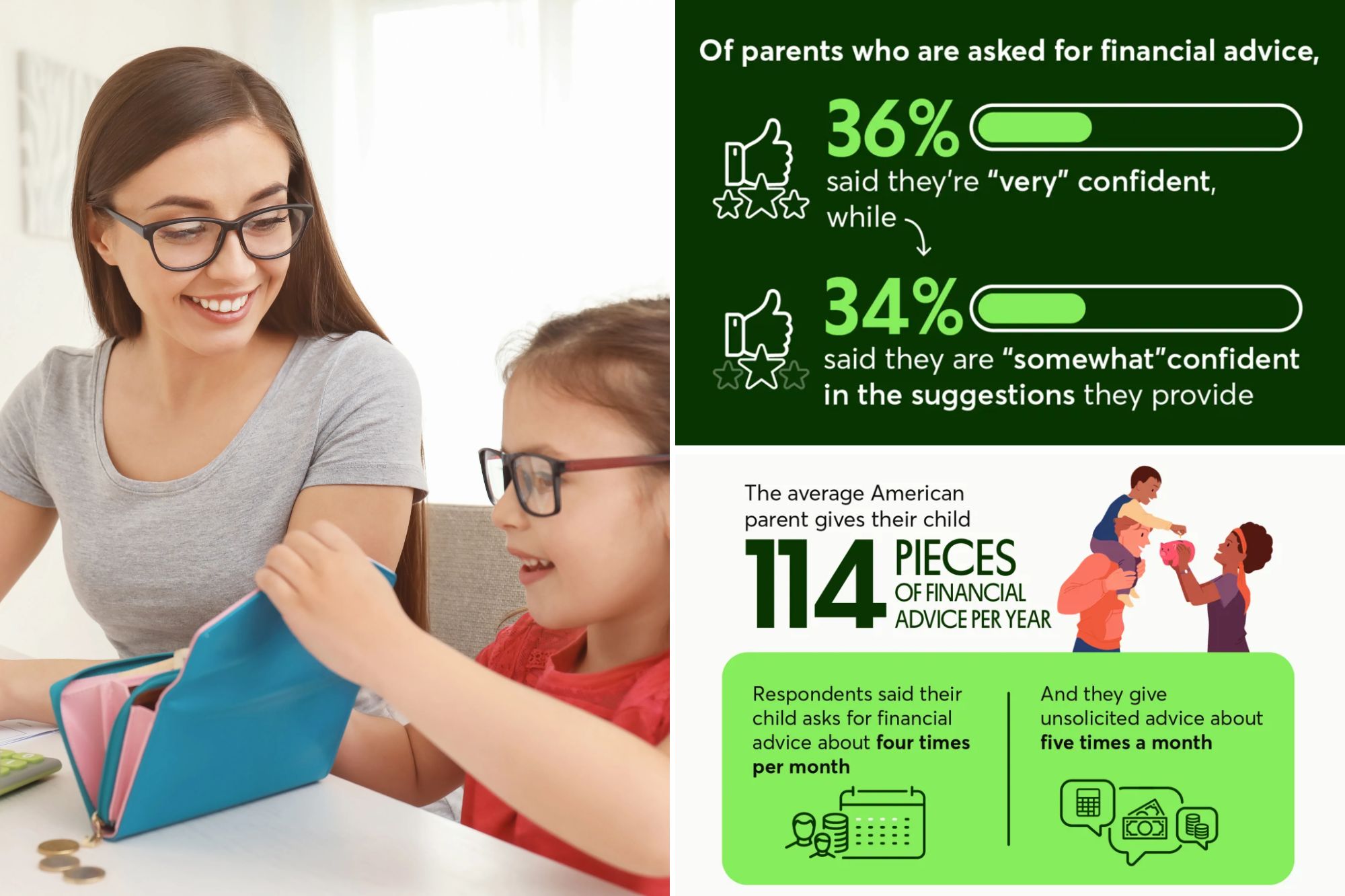
The average American parent gives their child 114 unique pieces of financial advice a year, according to a new study.
However, parents admit that their financial advice is not always used: respondents said their child listens only about half (54%) of the time.
A survey of 5,000 American parents—ages 30+ and evenly divided among 100 individuals in all 50 states—revealed this disconnect by asking respondents about the type of financial advice they give their children.
The research looked at different areas parents feel strong – or not – in their financial knowledge and how they are looking to improve the guidance they provide.
On average, respondents said their child seeks financial advice about four times a month. While this can open the door for conversation, the parents surveyed also give unsolicited advice about five times a month, adding up to over 100 shared tips a year.
In the survey conducted by Talker Research on behalf of international money app Wise, the findings showed that parents’ confidence levels vary in the advice they are giving their child.
Of those who are asked for financial advice, 36% said they are “very” confident, while 34% said they are “somewhat” confident in the suggestions they offer.
Of course, the variety of topics that parents are asked for advice on affects their ability to counsel their child.
Parents were least confident in their ability to offer advice when it comes to moving and managing money outside the U.S. Of a list of 15 different financial areas, parents had the lowest confidence in helping their child with international finance (4%).
They also lacked confidence in currency conversion (11%) and sending money abroad (14%).
On the other hand, most parents noted higher confidence in helping their child with budgeting their money (55%), managing savings options (52%) and navigating credit cards (41%), as well as the meaning of debt (32%). and credit scores (32%).
“Parents must manage countless complex conversations as they prepare a child for adulthood. Finance is certainly at the top of the list and with varying levels of confidence depending on the banking topic at hand, international finance is an area where more education is essential,” said Ankita D’Mello, Principal Product Manager at Wise.
“As our lives become increasingly global, whether that’s a child studying abroad or sending money to family and friends in another country, the importance of managing money across borders is only becoming a mainstay for parents and children alike. theirs.”
Regardless of their confidence levels on various financial topics, 40% of parents surveyed shared concerns that their children will “outgrow” the advice they are equipped to give. This is why many respondents said they are interested in learning more about financial topics, including international finance and related fields (19%).
For parents surveyed who want to learn more about topics related to international finance, it is because they are generally interested in it (36%) and they believe it is important to have knowledge as the world becomes increasingly interconnected (32%). Some want to learn more because either they (30%) or their child (22%) hope to travel internationally, or because it’s an area of their knowledge they feel they lack (27%).
Whether parents want to learn more about international finance or other topics, one thing is abundantly clear: 72% want to advance their financial knowledge to better help their children.
Why this increased appetite for financial knowledge? This may be due to the changing nature of how we manage our finances, as nearly three-quarters (74%) of respondents believe it has become more complicated since they were children.
When asked why they believe financial management has become more complicated, 48% of these respondents noted that the Internet makes it easy to search for financial information, but it’s hard to know what to believe.
Ultimately, this hunger for knowledge is contributing to a thirst for information, as nearly half of parents surveyed (46%) believe they have more to learn about financial management.
This may be why the vast majority (79%) of parents said they are open to new tools and resources to help them improve their financial literacy, and nearly a quarter (22%) are actively seeking new services to use.
SWNS
“Parents looking to increase their financial expertise don’t have to do it alone, especially those who want their children to listen to them more. Using tools built specifically to solve multifaceted financial problems like international payments is a great way to more easily navigate services that are traditionally challenging to understand,” said D’Mello. “With more information finance available now more than ever, it is essential to work with established, affordable, convenient and transparent providers, especially when looking to move money internationally.”
HOW CONFIDENT ARE PARENTS WHEN HELPING THEIR CHILDREN IN THESE FINANCIAL AREAS?
- Budgeting – 55%
- Savings options – 52%
- Credit cards – 41%
- Debt Management – 32%
- Credit score management – 32%
- Insurance – 29%
- Financing a car – 29%
- Investments – 21%
- Mortgages – 16%
- Retirement Planning (Roth vs. Traditional IRAs, etc.) – 16%
- High Yield Savings Accounts – 15%
- Sending money abroad (ie sending money to friends or family internationally) – 14%
- Obtaining/refinancing loans — 13%
- Currency conversion (ie, exchanging money when traveling) – 11%
- International finance (ie, moving or managing money internationally) – 4%
Survey methodology:
Talker Research polled US parents (age 30+) split evenly with 100 for each state. The survey was commissioned by Wise and administered and conducted online by Talker Research between August 29 and September 12, 2024.
#parents #give #children #good #financial #advice
Image Source : nypost.com